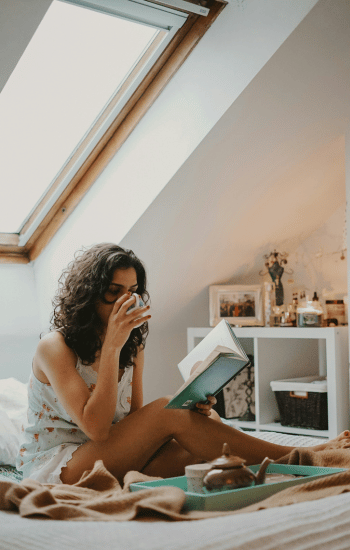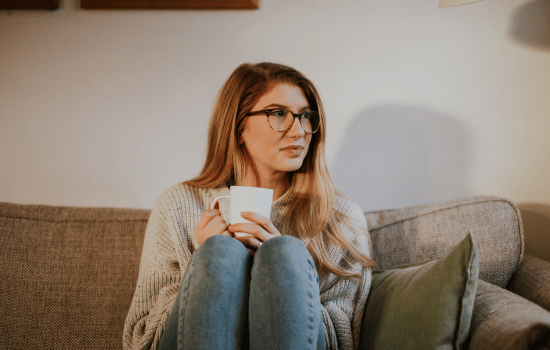
6 Best Therapy Exercises for Anxiety to Try at Home Today
Takeaway: If you struggle with anxiety, you know how overwhelming and uncomfortable it can be. Thankfully, there are plenty of effective ways to manage these feelings. Next time you’re feeling anxious, try one of these therapeutic activities for your anxiety symptoms to help you feel grounded.
If you struggle with anxiety, you are not alone. Anxiety disorders are now the most common mental health diagnosis. It is estimated that 30% of adults will struggle with an anxiety disorder at some point in their life. Anxiety is adaptive and allows us to become vigilant to danger or threat, although too much can become debilitating. The good news is that anxiety is very treatable and there are many different coping strategies to relieve symptoms and help you manage stress better.
Anxiety exists on a spectrum ranging from mild, moderate, to severe. Individuals who feel anxiety tend to worry about possible future events and experience physical symptoms such as muscle tension. It is common for individuals to begin associating certain situations as triggers for their anxious arousal and start avoiding these situations to reduce anxiety. This has adverse effects as it reinforces the fear and begins impacting their daily routine and living a happy life. People seek therapy to learn how to better cope with worry thoughts and reduce uncomfortable physical sensations in the body. A therapist may educate on different evidence-based anxiety exercises such as progressive muscle relaxation and breathing exercises. Anxiety is both physical and mental so cognitive restructuring is a way to manage anxious thoughts and aids in reducing anxiety as well. In this article, we will do a deep dive into the best anxiety treatment available to begin your mental health journey.
Understanding anxiety
Anxiety symptoms can present in many different forms in one’s life. Proper diagnosis is crucial to understanding the best way to manage worry thoughts and symptoms. Let’s distinguish between the various anxiety disorders below.
Generalized Anxiety Disorder (GAD)
- Excessive anxiety and worry that interferes with daily life most days
- Physical symptoms of restlessness, muscle tension, feeling on edge or easily fatigued
- Difficulty sleeping and concentrating
- The worry extends to a number of events or activities (such as work, job responsibilities, family, health)
Panic Disorder
Recurrent panic attacks and fear of panic attacks resurfacing, followed by several symptoms:
- Rapid breathing and heart palpitations
- Sweating
- Feeling light-headed or faint
- Trembling or shaking
- Feeling of shortness of breath
- Chills or hot flashes
- Feeling detached
- Fear of losing control
- Fear of dying
Individuals commonly believe they are having a medical emergency such as having a heart attack or other life-threatening illness and visit the emergency room.
Post Traumatic Stress Disorder (PTSD)
Develops after an individual is exposed to actual or threatened death, serious injury, or sexual violence or after having learned that a close family member or friend has experienced such an event.
Common symptoms:
- Recurrent, involuntary, or intrusive memories of the traumatic event
- Nightmares
- Flashbacks
- Emotional distress after exposure to traumatic reminders
- Avoidance of trauma related stimuli
- Dissociation
Phobias
Persistent and excessive fear of an object or situation that is generally not harmful. Individuals may have good insight that their fear is excessive, although cannot control it. Individuals will go to great lengths to avoid the feared object or situation.
Obsessive Compulsive Disorder (OCD)
- Uncontrollable and recurrent intrusive thoughts or images (obsessions)
- Repetitive behaviors, often in response to the obsessions (compulsions)
- Individuals spend more than 1 hour per day on the obsessions and compulsions
- Experience signifiant distress in major life areas due to the thoughts and behaviors
Social Anxiety Disorder (Social Phobia)
- Everyday social interactions cause irrational anxiety, fear, self-consciousness, embarrassment and affect a person’s social life
- Excessive fear about being judged, humiliated, or rejected by others
- Excessive concern around offending others
- Common fears are public speaking, meeting new people, eating/drinking in front of others
It is likely there is not one factor that causes an individual to develop an anxiety disorder, rather a combination of factors including genetics, environment, psychological, and developmental.

How therapy can help
Anxiety disorders can severely impair an individual’s functioning in major life areas such as work, school, relationships. Managing anxiety requires a specialized treatment approach and individuals who are struggling should see a therapist who has training and experience treating that type. A therapist will educate on anxiety therapy exercises such as breathing exercises and mindfulness techniques. It’s common for individuals to attempt to cope with negative emotions by avoiding situations that trigger her anxiety. A therapist will often incorporate exposure therapy to learn more effective ways to cope.
I’m Erica, a Licensed Marriage & Family Therapist who specializes in helping individuals manage anxiety and stress more effectively so they can step into their best self. The American Psychological Association recommends cognitive behavioral therapy as an effective treatment approach for anxiety disorders. At Erica Basso Therapy we utilize this approach to teach clients about the association between their thoughts and their feelings. CBT helps promote psychological flexibility by challenging negative core beliefs underlying many anxiety disorders.
6 therapy activities for anxiety to try at home today
These therapy activities are those who are looking for tips to manage stress and reduce anxiety symptoms at home, or who are not ready to enter therapy yet. Please note these activities are not meant to replace support from a licensed professional. 700-800 words.
1. Progressive muscle relaxation
Anxiety often brings tense muscles. In progressive muscle relaxation, you will learn how to relax various muscle groups. First you will tightly tense up particular muscle groups in your body such as your shoulders or fists. Then you will release the muscle group in particular and notice how your body feels as the muscle relaxes. This distinction between how you feel when various muscle groups are tense versus when they are relaxed will help you spot when you feel anxious through out the day and make a conscious effort to remain in a relaxed state and manage too much anxiety in the body.
2. Deep Breathing Exercises
A breathing exercise can help with stress and relieve anxiety. We have the power to influence our nervous system and activate our parasympathetic nervous system, which is our ‘rest and digest’ state. Diaphragmatic breathing or square breathing are two of our favorite recommendations for clients who are in need of effective coping skills to utilize between sessions and when experiencing heightened emotions. This is when you count in to a count of four, hold your breath for a count of four, and exhale to a count of four. This breathing pattern can be repeated for multiple cycles of breath until you feel calm.
3. Body scan
A body scan is another one of the relaxation techniques we highly recommend for stress management. It involves focused attention on different areas of the body, usually beginning with feet flat on the floor and spine upright, one will focus on each body part from their feet up to the crown of their head. This exercise promotes present moment awareness and being mindful of any sensations in the body. Body scans may vary in length, such as a few minutes to some lasting 20 minutes or longer.
4. Aerobic exercise
Incorporating physical exercise into your daily routine has been shown to be powerful to reduce stress and anxiety symptoms by reducing the stress hormone, cortisol, in the body and releasing feel-good endorphins. Amongst improved mood, exercise can also improve self esteem, cognitive function, and sleep quality.
5. Art therapy
Art therapy offers various therapeutic benefits such as stress reduction, emotional regulation, and creative expression to name a few. Creating art can also serve has a healthy distraction for overwhelming emotions and be a medium for individuals to express their feelings nonverbally.
6. Music therapy
Music therapy has the ability to evoke and regulate various emotions. Music therapy can also function by elevating ones mood by the release of endorphins, dopamine, and other neurotransmitters associated with pleasure and happiness. Music has even been shown to reduce perception of pain and improve quality of life.
A therapist’s perspective on anxiety exercises
If you want to reduce anxiety levels and achieve long-term management of it you will need to develop a mental “tool box” of various coping tools and strategies. Anxiety is adaptive and a normal part of life, so the goal is not to get rid experiencing it completely. We can think of feeling anxious as our built-in survival system, we want it when we are truly under threat but we don’t need it to produce false alarms when we are actually safe.
As a therapist I’ve witnessed first hand how these exercises named above have worked for various individuals struggling. For example, after the initial signs of anxiety coming on doing breathing exercises or progressive muscle relaxation can be a nice ‘reset’ button in your day. This can catch symptoms early on, which is ideal in it not elevating to uncontrollable levels, or even panic attacks. Our lifestyle and daily routines play a large factor in how anxious we feel as well, and research has shown exercise can have a powerful impact on cortisol levels in the body.
Individuals can try on these various exercises on their own, although there are situations where seeking support from a licensed mental health provider is indicated. If you feel as though your anxiety is getting in the way of your functioning in important life areas such as work, relationships or your health it may be indicated that you would benefit from more professional support.
Get the support you need heal from anxiety for good.

At Erica Basso Therapy, our team of compassionate clinicians are experienced and trained in treating a variety of anxiety disorders and can help you get on a path to better mental health. We offer individual therapy for those struggling with managing overwhelming periods of life and are happy to offer a complimentary 15-minute phone consultation to determine if we may be the right fit for you. On the call we can determine which therapist may be best fit for your needs and we can answer any questions you may have about getting started with your therapy journey. Please click here to inquire about your consultation with one of our trained therapists today.